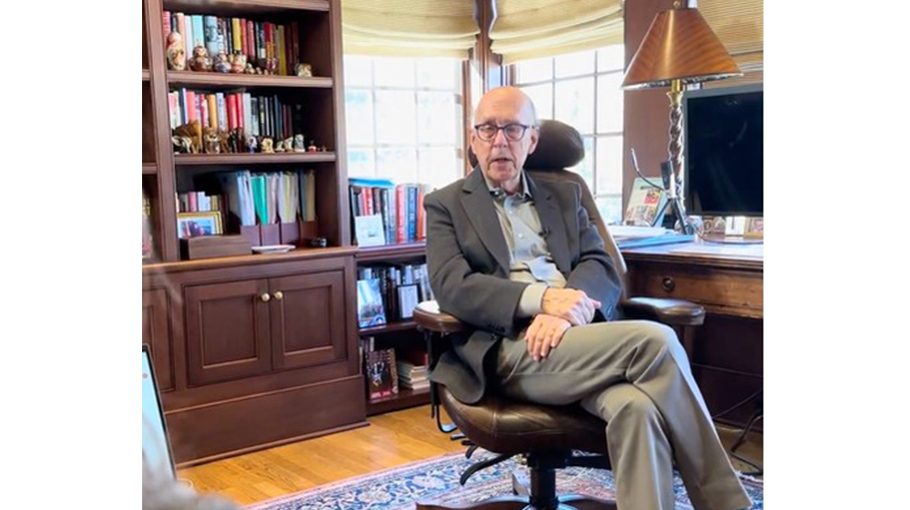China bans ‘former good friend’ from talking about Hong Kong’s Stephen Roach in interview with RFA

China’s former “good friend” economist and ex-chairman of Morgan Stanley Asia Stephen Roach said he was prohibited from discussing Hong Kong in his speech while attending the China Development Forum in Beijing last week.
Roach was invited to speak at this year’s forum in his capacity as senior fellow at Yale University’s Jackson Institute for Global Affairs, where he had hoped to raise his concerns about Hong Kong’s future.
But he told Radio Free Asia that he was stopped, as organizers made it clear before, during and after the forum that they did not want to hear sharp questions, only “views constructive to China.”
“I’ve written a few articles that raised serious concerns about the future of Hong Kong and those touch on sensitivities in Beijing, and largely for that reason, they asked me not to speak about that at the China Development Forum.”
In addition, he criticized Hong Kong academic and business representatives at the forum for not truthfully reporting Hong Kong’s situation to Beijing. He cited, as an example, his discussions on China’s financial market policies with a 20-year acquaintance and current chairman of the Hong Kong Stock Exchange, Laura Cha, on a separate occasion on the sidelines of the forum. Roach said he had raised three points: Hong Kong and China’s economies are interdependent on each other, concerns about the negative impact of the U.S.-China political conflict on Hong Kong trade, and worries of Hong Kong’s autonomy especially after the enactment of the second national security law, commonly known as Article 23.
“So I said all three of those will spell trouble for Hong Kong in the years ahead, and Laura Cha agreed with two of my three points – the Chinese economy, the adverse impact of the U.S.-China conflict,” Roach said.
“But she did not agree with my point on Hong Kong’s political autonomy being compromised by either Beijing or its own,” he said, adding that his argument stemmed from an economic consideration and not politics, which almost no one has disputed.
Roach stated that “Hong Kong is over” in a February commentary published in the Financial Times, attributing the demise of the city, an international financial center, to its domestic politics, China’s structural problems and the worsening U.S.-China tensions.
He also then claimed the turning point of Hong Kong’s decline was when former Chief Executive Carrie Lam introduced the extradition bill that triggered large-scale democratic demonstrations in 2019. He described Beijing’s subsequent imposition of the national security law in 2020 to have “shredded any remaining semblance of local political autonomy.”
Last month, the Hong Kong government swiftly passed Article 23, which expanded the scope of what constitutes a breach of national security by creating new offenses and increased punishment for offenders.
A transformed platform
The first China Development Forum was opened in 2000 by then Premier Wen Jiabao. But it was conceived by Wen’s predecessor, the reformist premier Zhu Rongji, as a platform for Chinese leaders to debate and discuss policies and issues in the presence and participation of foreign experts.
In previous years, the forum also featured a closed-door discussion with foreign chief executives where China’s number two in power, the Chinese premier who has traditionally held the economic portfolio, entertained questions from foreign investors. The premier’s meeting was canceled this year.
Roach has attended the forum for 24 consecutive years, since the first edition in 2000. He said in the Zhu era, issues could be discussed freely and openly, recalling a session at the 2001 forum in which Zhu sat in and participants openly debated on issues.
“I urge current Chinese and Hong Kong leaders to do likewise. Debate on issues and not based on personal political agendas.”
Roach’s recent “Hong Kong is over” theory has incited fury among the establishment, including former Chief Executive Leung Chun-ying and Executive Councilor Regina Ip. Still, he vowed to continue to speak out for the benefit of Hong Kong and China.
When asked whether he would be worried about not being able to return to Hong Kong after Article 23 was passed, the economist paused before responding.
“If constructive criticism causes uncomfortable reactions from politicians and business people, they need to look at themselves,” he said.
Should he be unwelcomed to return, he stressed that he will continue to write and speak to tell the truth, as “debate is more important than personal pressure.”
According to Roach, foreign investors are seriously assessing the risks of doing business in Hong Kong, amid the uncertainty of how Article 23 will be enforced and interpreted, which has cast a shadow on the city’s autonomy under the one county, two systems principle.
Compounded by the U.S.-China spat, capital outflows may intensify, he warned.
Since the beginning of 2020, the U.S. has announced three rounds of sanctions, sanctioning a total of 18 Beijing and Hong Kong government officials, including Chief Executive John Lee, Chief Secretary Eric Chan, Security Secretary Chris Tang, and Constitutional and Mainland Affairs Secretary Erick Tsang.
U.S. Secretary of State Anthony Blinken announced last Friday his intention to impose entry restrictions on more Hong Kong government officials.
This year’s China Development Forum was attended by more than 200 delegates, including eight representatives from Hong Kong.
Business leaders apart from Laura Cha included Johnson Cha, chairman of C.M. Capital Advisors, Jacob Kam, chief executive officer of MTR Corporation, Vincent Lo, chairman of Shui On Group, and Richard Li, chairman of Pacific Century Group.
From academia, there were Lawrence Lau, economist and former vice-chancellor the Chinese University of Hong Kong (CUHK), Zheng Yongnian, founding director of the Institute for International Affairs at CUHK Shenzhen, who is regarded as one of Chinese President Xi Jinping’s “national mentors”, and Li Cheng, a political scientist at the University of Hong Kong.


